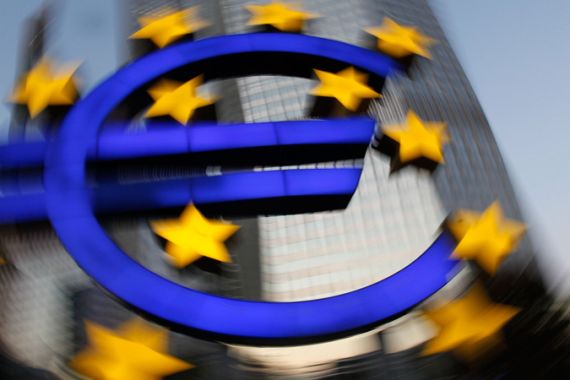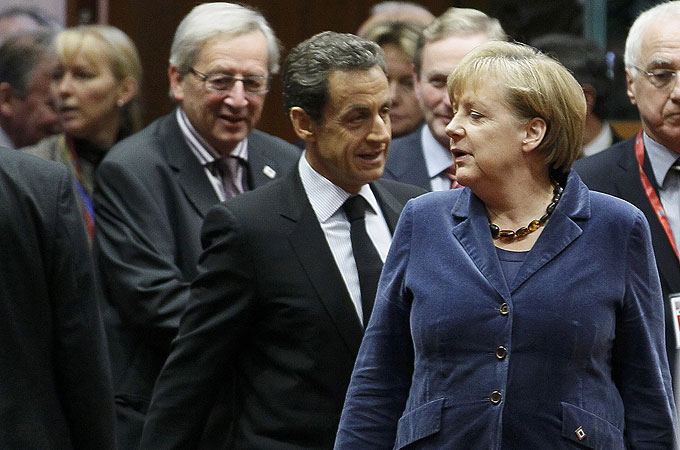Q&A: Eurozone debt crisis
Al Jazeera takes a closer look at why the eurozone debt crisis matters, and possible solutions to the problem.

 |
| France and Germany disagree over how to give the region’s bailout fund greater firepower [Reuters] |
European leaders have unveiled a package to address the eurozone debt crisis.
As details of the package emerge, Al Jazeera takes a closer look at the origins of the debt crisis, what is happening in the eurozone right now, and why the crisis matters.
Keep reading
list of 4 items‘Triple spending’: Zimbabweans bear cost of changing to new ZiG currency
Boeing hit with 32 whistleblower claims, as dead worker’s case reviewed
US imposes new sanctions on Iran after attack on Israel
What is happening in the eurozone right now?
For two years, several European countries have faced difficulties in repaying their debts to their creditors and bondholders. These countries include Greece, Ireland, and Portugal. The debt crisis was triggered by the worldwide financial collapse that began in 2008 and exacerbated by poor financial management.
Many European economies were living beyond their means in recent years, and the level of debt has placed a strain on the economies that have been spending more than their income. The problem is not just confined to these countries: Failure to find a workable solution to the crisis could significantly damage economies around the world.
What role do bonds play in the eurozone debt crisis?
Bonds are essentially loans. Bondholders – which can be private individuals, banks, pension funds, foreign governments, or other institutions – make an up-front payment to a company or government (known as an “issuer”) that needs money in the short-term. Over the lifespan of the bond, which can be as long as 30 years, the issuer regularly pays interest to its bondholders. At the end of the bond’s lifespan, the issuer has to repay the bondholder for the amount of money it paid up-front.
If a company or government cannot make good on its interest payments, this is known as “default”. Governments rarely fully default on their bonds; instead, they often force bondholders to accept a “haircut”, or a partial reduction in what they are owed.
Why does the eurozone debt crisis matter?
| In Video |
|
Eurozone leaders meet to thrash out debt deal |
The debt crisis is not only a problem for Greece. It has spread and “infected” other countries, such as Portugal and Spain. Other countries could succumb to the crisis if bondholders lose faith in their ability to repay debt.
If Greece fails to repay bondholders, banks that hold Greek debt would have to take losses, possibly causing them to become undercapitalised. This could then require government bailouts in order to make affected banks cover their loans. These bailouts could, in turn, cause these governments to run huge deficits, causing the debt to spread. Credit is the lifeblood of modern economies, and if banks are unable to lend because they are insolvent, economies are at risk of sinking into recession.
How did the debt crisis originate?
Greece’s crisis began in 2009; however, the roots of the problem can be traced to the global economic crisis that began in 2008, which was fuelled by the collapse of the US housing bubble and the subprime mortgage market.
For a long time, the Greek government spent more money than it took in. Because of this, the government had to borrow money to cover the difference.
When a new government, led by George Papandreou, was elected in Greece in 2009, it revealed that the previous government had fudged its financial data. The world had thought that Greece’s deficit was about six per cent of its GDP. In fact, the new government announced, Greece’s deficit was over twice as high: 12.7 per cent.
This revelation shocked bondholders. Because investors became less confident about Greece’s ability to repay them, they demanded Greece pay higher interest rates on their bonds. This had a spiral effect: The more Greece had to pay bondholders in interest, the more it had to borrow, which in turn drove up interest rates even more.
Greece’s debt problems led investors who owned bonds issued by other peripheral Eurozone countries to lose confidence, especially because banks in France, Germany and the UK owned over $56bn worth of Greek government bonds.
Right now, Greece does not have enough money to repay its bondholders in full. To become solvent, other Eurozone countries – especially Germany, the biggest and strongest economy in the Eurozone – have lent Greece money at low interest rates to repay its bondholders.
These bailout loans were made under the condition that Greece also implements so-called “austerity” measures. The conditions required Greece to raise taxes and reduce public sector spending, so that it could eventually have a budget surplus to pay back its debt.
Unlike Greece, Ireland did not run big spending deficits before 2008. Instead, Ireland’s problems largely were the result of the housing bubble collapse. Its government had agreed to bail out Irish banks that had lost money in the collapse. But the size of the bailout was much larger than initially expected, causing the government to run huge deficits. In order to avoid defaulting on its debt, Ireland cut spending, raised taxes, and received an $121bn rescue package from the International Monetary Fund and EU.
Spain and Portugal also faced big budget deficits following the 2008 financial collapse and subsequent recession. Portugal received a bailout package in May 2011, while Spain is attempting to remain solvent by balancing its budget and introducing severe austerity measures.
Now, concern is also rising that Italy might be unable to pay the $2.5tn of debt that it owes.
What does the euro have to do with the debt crisis?
In 1999, 11 European countries adopted a common currency, the euro. Two years later, Greece adopted the euro as well, and there are now 17 eurozone member countries. Because investors viewed the euro as a strong, stable currency, they weren’t very worried about inflation when they bought Eurozone countries’ bonds. As a result, Greece was able to issue bonds at lower interest rates than it would have been able to before adopting the euro.
In part because it could borrow money more cheaply, Greece went on a spending spree due to the lower interest rates – and financed this spending by issuing bonds.
What is the EU trying to do to solve the debt crisis?
European leaders met in Brussels and have reached a “three-pronged” agreement, which has been described as a vital step to solve the region’s debt crisis. During the marathon session on Wednesday, leaders discussed how to cut and restructure Greece’s debt, how the European Financial Stability Facility (EFSF) should function, and how to strengthen undercapitalised European banks.
| Eurozone deal |
|
|
Here are the main components of the EU’s recent package:
- Greece will be allowed to pay back less than it actually borrowed, which means that bondholders will not be repaid in full. Previous proposals have stipulated that creditors be written off 20 per cent of what they are owed, but private banks have agreed to take a “voluntary” 50 per cent loss on the face value of their Greek debt. The accord will bring Greek debt down to 120 per cent of the country’s gross domestic product by 2020.
- The European Financial Stability Facility (EFSF), which is the eurozone’s rescue fund, has been leveraged to guarantee $1.4tn dollars of bonds to better protect countries like Spain and Italy. Details on how Europeans would enlarge their bailout fund to achieve this goal remain unclear. France and Germany disagree on how to increase the EFSF’s firepower. German Chancellor Angela Merkel wants private banks to take more losses on Greek debt, while French President Nicholas Sarkozy wants the eurozone members to offer more financial security to troubled banks.
- Leaders agreed on a plan to increase the capital base in European banks to $150bn, so that they can better withstand a sovereign debt crisis. They would do this by selling new shares to investors. However, if investors don’t buy the shares and governments don’t have enough money to step in, there are questions as to how the banks will raise the extra money.
What is the Greek government doing now?
As protests continue in Athens’ Syntagma square over the government’s deficit reduction plan, Greece is pushing forward with this plan regardless. According to the Guardian newspaper, “Last year, [Greece] cut 10 per cent of public sector jobs and slashed between 15 per cent and 30 per cent off the wages of those lucky enough to stay on the state payroll.”
Greece’s government has said it will continue to cut public salaries, and Papandreou has introduced a privatisation programme he hopes will bring in $71bn. There are also plans for the government to sell its holdings in post offices, banks, railways, ports, and the state lottery.
What happens when a government defaults?
When a country’s government is unable – or refuses to – pay its bondholders what they had been promised, investors can become wary of lending money to that government in the future. As a result, they will often demand higher interest rates in exchange for investing in that country’s bonds. If capital inflows suddenly stop, this can have disastrous effects for the country’s economy.
In 2008, the collapse of the housing bubble ravaged Icelandic banks, which had taken on huge risks during the years before the crash. Iceland’s government took control of the troubled banks, which owed huge amounts of money to its bondholders. Instead of paying these bondholders in full, Iceland defaulted by paying them only a percentage of what they were owed. Although Iceland was shunned by investors for a few years thereafter, the country was able to issue bonds this year at a five per cent yield, which is a relatively low rate.
Why is the Eurozone crisis political?
How indebted countries deal with their burden is by its very nature political. Cutting social services to repay bondholders – many of which are foreign institutions – often stokes resentment, especially among the younger generation, many of whom experience high unemployment rates.
Greece’s economy is already contracting, and tax hikes and spending cuts will likely cause the economy to contract even further, leading to a rise in unemployment. Already, attempts to balance Greece’s bloated budget have led to mass protests and general strikes.
There is disagreement within Europe as to how much sovereignty eurozone countries should have over their budgets, given that these countries share a common currency. Even countries that were central to the Union’s European project, like the Netherlands, are increasingly skeptical of the eurozone.
Many taxpayers in the richer eurozone countries, like Germany, are already tiring of bailing out other eurozone countries; however, opinion in these countries is divided.
Meanwhile, eurozone countries are considering asking non-European countries, such as China and Brazil, to contribute to a bailout fund.
 Private banks holding Greek debt accept a 50 per cent “haircut”
Private banks holding Greek debt accept a 50 per cent “haircut”